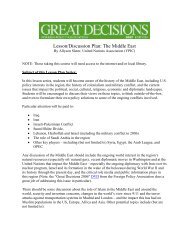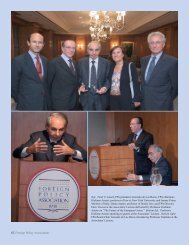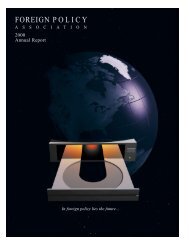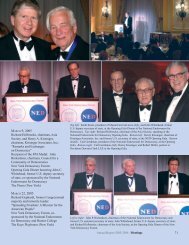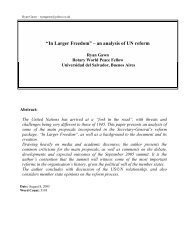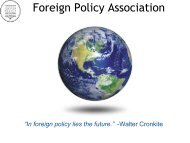Celebrating 90 Years - Foreign Policy Association
Celebrating 90 Years - Foreign Policy Association
Celebrating 90 Years - Foreign Policy Association
You also want an ePaper? Increase the reach of your titles
YUMPU automatically turns print PDFs into web optimized ePapers that Google loves.
tional institutes rather than in universities,<br />
divorcing cutting-edge research from training<br />
the next generation of industrial scientists and<br />
engineers. In the United Kingdom, as well as<br />
continental Europe and Japan, most research<br />
funding has been allocated by block grants<br />
to universities, or perhaps to departments<br />
within universities, rather than by the intensely<br />
competitive process of peer-reviewed grants<br />
to individuals and research groups.<br />
As a consequence of this politicization<br />
of research funding, our lead in science<br />
has been maintained for many decades. Even<br />
today, more than 30 percent of scientific publications<br />
worldwide are authored in the United<br />
States. Nearly half of the world’s Nobel Prizes<br />
in science go to Americans.<br />
Our competitive advantage in emerging<br />
industries based on science—such as computers<br />
in the 1960s, software in the 19<strong>90</strong>s, and<br />
biotechnology today—should not be taken for<br />
granted. Federal funding in support of basic<br />
research has waxed and waned. The budget<br />
of the National Institutes of Health doubled<br />
between 1998 and 2003, creating a 14 percent<br />
annual rate of growth. Yet for the past five<br />
years, the NIH budget has grown at an annual<br />
rate of less than 2 percent, which fails even to<br />
keep pace with inflation. Much of the young<br />
talent that was trained during the boom cannot<br />
get funding today.<br />
What we need in order to succeed as a<br />
nation is steady, predictable growth in basic<br />
research. It is the seed corn of technological<br />
progress and economic prosperity. And we<br />
need that steady, predictable growth to be at<br />
or around the long-term average growth rate<br />
of GDP. If we do not achieve this rate, we are<br />
likely to lose our lead in biomedical technology,<br />
and we will fail to establish ourselves as the<br />
world leader in other major areas of emerging<br />
importance—for example, alternative energy<br />
technologies.<br />
TRANSLATING SCIENCE INTO VIABLE<br />
TECHNOLOGIES<br />
Turning to leadership in innovation: our<br />
“hard” and “soft” power in foreign affairs, as<br />
suggested above, depends upon the strength<br />
of the economy. The strength of the economy<br />
depends not only on our scientific leadership,<br />
but also on our national capacity to translate<br />
cutting-edge science into commercially viable<br />
technologies. This capacity in turn depends<br />
upon two principal factors: the availability of<br />
financial capital and an abundance of innovative<br />
entrepreneurial human capital. Our highly<br />
decentralized financial system, despite the<br />
endemic cyclicality of which we are painfully<br />
aware today, has unique advantages in encouraging<br />
investment in innovation. Funding<br />
for startup companies is, by far, more easily<br />
available and more adequately supported by<br />
value-added services in the United States than<br />
anywhere else in the world.<br />
Thanks to the kind of higher education<br />
we provide, the human capital required for innovation<br />
is also more abundant and more<br />
FOREIGN POLICY ASSOCIATION | 23<br />
PRESENTATION BY RICHARD LEVIN




